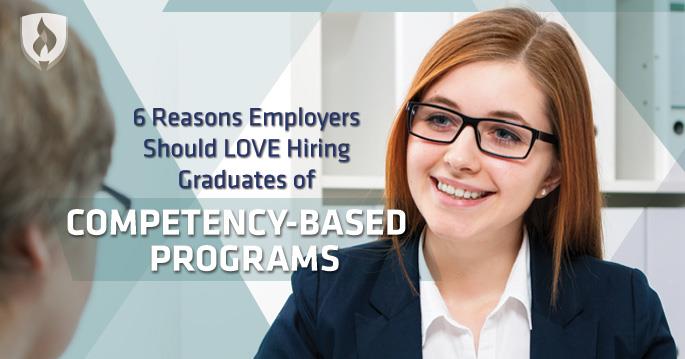6 Reasons Employers Should LOVE Hiring Graduates of Competency-Based Programs
By Jess Scherman on 10/12/2016

Those in-tune with higher education circles know that competency-based education (CBE) is on the rise. This up-and-coming model of online learning offers students the opportunity to earn college credits at a pace that mirrors their knowledge.
As students in CBE programs progress through learning objectives – or competencies – they can demonstrate a mastery of content at their own pace. This results in more time spent strengthening areas of weakness, and less time spent on redundant coursework. Many believe this model paves the way for a more practical and well-rounded learning experience, deeming CBE the future of higher education.
With nationwide initiatives in place that favor CBE, questions have begun to crop up about this contemporary model of learning. One of the most frequently asked is whether a degree from a CBE program will be seen as equivalent to that of a traditional collegiate track. Will prospective employers even be able to tell the difference?
Experts in all things higher education and CBE would argue there is a difference – but the difference is that CBE programs may actually better prepare students to enter into the workforce. Check out these six reasons employers can benefit from hiring graduates of competency-based programs!
6 benefits of hiring graduates of competency-based programs
1. You know what you’re getting
Competency-based programs provide potential employers with better insight into what graduating students know and can do, according to David Lungren, vice president of digital content solutions at Collegis Education.*
While it’s hard to know what exactly a student learned in the ‘BUS 101 Introduction to Business’ class, employers can be confident CBE grads have mastered specific skills. “CBE breaks the degree down into a number of individual competencies,” Lungren explains. “Each individual competency provides clear detail about what the student has learned, and more importantly, what the student can do.”
When the employer is aware of the specific capabilities of the job candidate, a better hiring decision can be made.
2. Less time will be spent on training
The model of competency-based learning hinges on each student demonstrating his or her mastery in the required areas. For that reason, employers can confidently assess a CBE graduate’s knowledge and abilities within his or her field.
“When a student demonstrates mastery of competency in their educational program, it shows that they have a thoroughly developed skill set,” says Jess Chua, the certified career coach behind InnerLifeGoals.com. “Employers can spend less time training employees and focus on benefiting from an employee’s relevant expertise.”
3. Candidates have mastered fast-paced learning
One of the most attractive attributes of a CBE program is the fast-paced flexibility it affords. This allows students to “test out” of subjects in which they are already competent so that they can focus on the areas that could use strengthening. This requires a healthy amount of self-regulation in the midst of fast-paced learning.
“Employers want their employees to be well-educated in order to grow within their company, but they also don’t want them to take years to graduate,” says Adrian Ridner, CEO and co-founder of Study.com. Through CBE programs, employers can gain a skilled, educated workforce in less time, he explains.
4. Efficient learners make for productive employees
Competency-based learning is all about efficiency. It allows students to bypass the traditional model of receiving college credit in favor of a more flexible and productive option. Students can accelerate through a CBE degree program by receiving credit through pathways like third-party assessment of prior learning.
“The efficient delivery of a well-rounded curriculum increases productivity since the student can make a quicker return to the workforce upon program completion,” Chua explains. These habits of productivity and efficiency will also prove helpful while on the job.
5. Graduates are prepared for real-world thinking
“Well-designed CBE programs leverage authentic, project-based assessments to measure student mastery of competencies,” Lungren explains. “Authentic assessments require students to perform the same tasks and make the same decisions that are required as a professional in the workplace.”
This authentic assessment approach translates perfectly from the virtual classroom to real life, as it prepares students to think critically and problem solve on the job.
6. Experience with work-life balance will come in handy
All great employers know that a person’s life shouldn’t revolve solely around his or her job. The best employees are the happiest employees. It can be difficult for employees to balance the competing demands of work, life and – if considering furthering their education – school.
“CBE is typically delivered in an online, self-paced or self-directed fashion,” Lungren explains. “This delivery approach allows students to consume their education without the structure and burden of weekly assignments, class meetings or deadlines.”
Participation in CBE courses helps students build critical skills to balance their professional and personal responsibilities. This is the same skill set that can aid in achieving a healthy work-life balance as an employee.
Proceed toward CBE with confidence
By now it’s no secret: CBE programs qualify students for the workforce in a way employers should prefer! If you’re drawn to the flexible, fast-paced environment of competency-based programs, consider this your final push to just go for it – your future job-seeking self will thank you!
Still not sure whether competency-based learning is the right modality for you to tackle heading back to school? Learn more about the advantages of this option in our article: 6 Benefits of Competency-Based Education that will Excite Adult Learners.
RELATED ARTICLE:
*Collegis Education is the marketing vendor of Rasmussen College.




